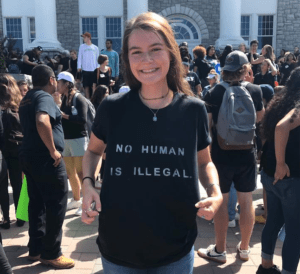Hannah Turner is one of those young adults religion surveys and church consultants consistently describe as demanding social action and community engagement opportunities from the congregations they attend.
At 23, the recent college graduate is bringing her experience as an advocate for refugees and homeless people to Welcome House Raleigh, the North Carolina ministry of Kim and Marc Wyatt, field personnel with the Cooperative Baptist Fellowship.
Turner is the first placement in the relaunch of CBF’s Global Service Corps. The program, offline for a decade until now, matches individuals with CBF Global Missions needs for two-year appointments.
The needs of Welcome House, which provides temporary housing, educational and other ministries for refugees and immigrants, was the draw for Turner, who studied public policy and humanitarian affairs at James Madison University.

Hannah Turner
Turner grew up a Southern Baptist pastor’s kid whose parents were dedicated to living among and serving homeless people in Richmond. That’s where she witnessed faith modeled as action.
“One of the big things was seeing that my role in the church and being part of the capital ‘C’ church doesn’t just equate to going to worship on Sundays, but that it’s a day-to-day thing,” she said.
Turner’s Welcome House responsibilities will include teaching online ESL courses and fostering relationships between refugees and area churches. She’ll also be responsible for raising funds to support her two-year stay in Raleigh.
Kim Wyatt said she has full confidence in Turner. “Young people are the ones doing this kind of ministry now. We are encouraged that young adults like Hannah are willing to embrace refugees.”
Turner spoke with Baptist News Global about how Global Service Corps lines up with her calling to serve others.
Please share about your parents’ ministry.
My dad is the pastor of the church where I grew up, and my mother is the community missionary who works with the homeless population in Raleigh. Both of them have a heart for wanting to serve and to live among the people they are helping. So, we grew up in the neighborhood of Oregon Hill, which is where my church – Pine Street Baptist – is located. When they moved there, it was made up of a lot of lower income households. That was my parents’ reasoning for wanting to live within the neighborhood. My mom runs a food pantry and a clothes closet. They have lockers that people can store their personal belongings in and get mail delivered to. And they have a laundry service they partner with other churches on. My mother is like a social worker without the social work degree.
“We are encouraged that young adults like Hannah are willing to embrace refugees.”
How did your parents’ faith and ministry rub off on you growing up?
My parents are such giving people. They were always serving. They were always on. Seeing that in them kind of rubbed off on me and my sister with a passion for wanting to serve the communities we’re in.
How did you learn about CBF growing up in a Southern Baptist church?
When I was growing up, we had a lot of people come through our church who were affiliated with CBF. The children’s ministry leader when I was growing up was CBF. We had a lot of young adults come through doing after-school programs that I was involved in, and they were CBF as well. There were members of my church who later became CBF personnel.
What stood out to you about them?
They were amazing people, and my family is still in contact with some of them. But I feel like as time goes on, the Baptist church at least doesn’t talk as much about denominations and the distinguishing things between them anymore. Growing up, I didn’t think, “Oh, this person is a CBF person and this is an SBC person.”
When did you first meet the Wyatts, and how have they inspired you?
They’re great. I met them after I had started going through the process of discernment for Global Service Corps and their position with the Welcome House struck my eye. They are so encouraging. They are quick to remind me that God has called me here for a purpose and that God doesn’t pick qualified people, God qualifies the people he’s called. They are just such a great support system.
How do you describe to friends what Global Service Corps is?
I think of it as a faith-based Peace Corps. You go somewhere to immerse yourself in the culture where you’ve moved. And it’s also about learning from the people you’re serving.
How do you plan to raise the money you need during that two-year period?
I had to hit a certain minimum just to move to Raleigh, and then over the next two years I have to make sure I get the total amount. A lot of that comes from either one-time or monthly givers, and I have a web page you can donate to.
Is the fundraising part intimidating?
I had never done anything like that. It’s an interesting experience to ask for money for yourself. The money is to pay rent and have a stipend for each month. So, it was definitely a humbling thing. And I feel fundraising in a pandemic is definitely hard. But social media is a big help.
How much responsibility will you eventually have at Welcome House?
I will eventually take on being an ESL teacher, and right now I am observing the other volunteers who work with Welcome House Raleigh. And those activities are all virtual right now. I’ll be helping with the preschool readiness for some of the refugee families, also virtually. And I will be assisting around Welcome House itself with maintenance and actually welcoming new guests to the country who come and stay there. I’ll also be the connection point between the international community and CBF churches in Raleigh.
You say you are drawn to serving refugees. How is that an expression of your faith?
“When I read the gospel, I see Jesus reaching out to those marginalized groups and being in those groups.”
Reading the Bible and growing up the way I did, I saw how Jesus lived out his faith and the way he connected with others through relationships. I have seen Jesus within other people, like my parents, and people at my church and friends who have lived out that mission. That’s what I found so striking about Welcome House. It creates spaces for relationships between God’s people to be formed, specifically with marginalized people. When I read the gospel, I see Jesus reaching out to those marginalized groups and being in those groups. I think that’s why I feel pulled to that ministry.
Would you say this is a calling?
I’ve always had a calling to help people in the widest sense. I didn’t know about the immigrant and refugee community until I got to college and volunteered with resettlement agencies there and got to interact with people. That’s when I realized I really enjoy being in these people’s presence and learning from them. Yes, I feel I have a calling to be there.
Are you excited that President-elect Biden has pledged to increase the number of refugees allowed into the country?
It’s exciting that we’re going to have an administration that seems to be, policy wise and heart wise, welcoming to refugees. While it’s sad our current administration hasn’t been as welcoming, I think this season we have been through, with fewer refugees allowed in, has been a season of waiting. And although it may seem like a dry season or a barren place that we’re in, God is bigger than those dry places and is using it to prepare us for greater things. That’s something Marc and Kim have expressed to me, too. They said this slow period has given us time to build a team and to build volunteers and to build resources so we can be better equipped when things do pick up.
What concerns or excites you most about this opportunity?
What I want most is to be aware of my own biases and my own presumptions about other people, and also about my privilege. I must always remember I am walking a fine line between being helpful to people letting them be independent in making their own choices, because they are resilient. People in public service, particularly Christians, often want to be saviors — and I want to be careful not to fall into that. And I’m most excited about the connections that are going to be formed with our clients and with my students and the church community in Raleigh.
Related articles:
Refugee ministries adapt amid COVID and government slowdown
Biden plans to restore refugee admissions, but rebuilding the system will take time


